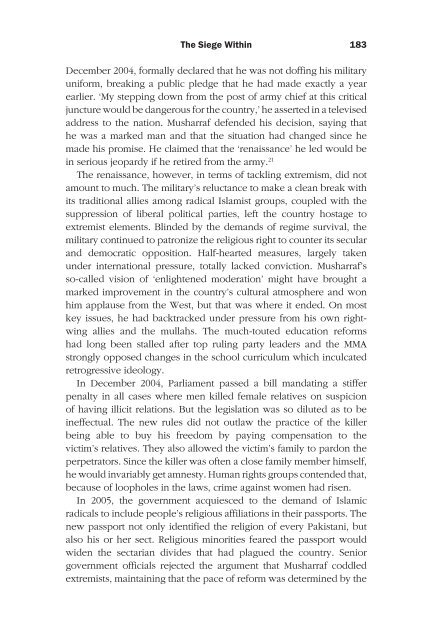Frontline Pakistan : The Struggle With Militant Islam - Arz-e-Pak
Frontline Pakistan : The Struggle With Militant Islam - Arz-e-Pak
Frontline Pakistan : The Struggle With Militant Islam - Arz-e-Pak
You also want an ePaper? Increase the reach of your titles
YUMPU automatically turns print PDFs into web optimized ePapers that Google loves.
<strong>The</strong> Siege <strong>With</strong>in<br />
December 2004, formally declared that he was not doffing his military<br />
uniform, breaking a public pledge that he had made exactly a year<br />
earlier. ‘My stepping down from the post of army chief at this critical<br />
juncture would be dangerous for the country,’ he asserted in a televised<br />
address to the nation. Musharraf defended his decision, saying that<br />
he was a marked man and that the situation had changed since he<br />
made his promise. He claimed that the ‘renaissance’ he led would be<br />
in serious jeopardy if he retired from the army. 21<br />
<strong>The</strong> renaissance, however, in terms of tackling extremism, did not<br />
amount to much. <strong>The</strong> military’s reluctance to make a clean break with<br />
its traditional allies among radical <strong>Islam</strong>ist groups, coupled with the<br />
suppression of liberal political parties, left the country hostage to<br />
extremist elements. Blinded by the demands of regime survival, the<br />
military continued to patronize the religious right to counter its secular<br />
and democratic opposition. Half-hearted measures, largely taken<br />
under international pressure, totally lacked conviction. Musharraf’s<br />
so-called vision of ‘enlightened moderation’ might have brought a<br />
marked improvement in the country’s cultural atmosphere and won<br />
him applause from the West, but that was where it ended. On most<br />
key issues, he had backtracked under pressure from his own rightwing<br />
allies and the mullahs. <strong>The</strong> much-touted education reforms<br />
had long been stalled after top ruling party leaders and the MMA<br />
strongly opposed changes in the school curriculum which inculcated<br />
retrogressive ideology.<br />
In December 2004, Parliament passed a bill mandating a stiffer<br />
penalty in all cases where men killed female relatives on suspicion<br />
of having illicit relations. But the legislation was so diluted as to be<br />
ineffectual. <strong>The</strong> new rules did not outlaw the practice of the killer<br />
being able to buy his freedom by paying compensation to the<br />
victim’s relatives. <strong>The</strong>y also allowed the victim’s family to pardon the<br />
perpetrators. Since the killer was often a close family member himself,<br />
he would invariably get amnesty. Human rights groups contended that,<br />
because of loopholes in the laws, crime against women had risen.<br />
In 2005, the government acquiesced to the demand of <strong>Islam</strong>ic<br />
radicals to include people’s religious affiliations in their passports. <strong>The</strong><br />
new passport not only identified the religion of every <strong><strong>Pak</strong>istan</strong>i, but<br />
also his or her sect. Religious minorities feared the passport would<br />
widen the sectarian divides that had plagued the country. Senior<br />
government officials rejected the argument that Musharraf coddled<br />
extremists, maintaining that the pace of reform was determined by the<br />
1













